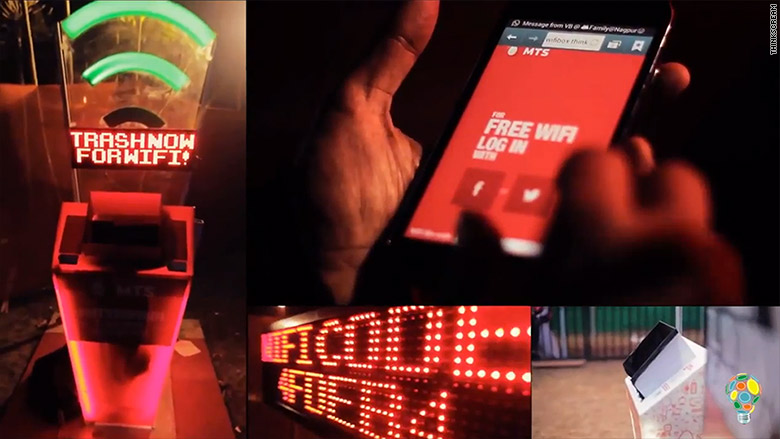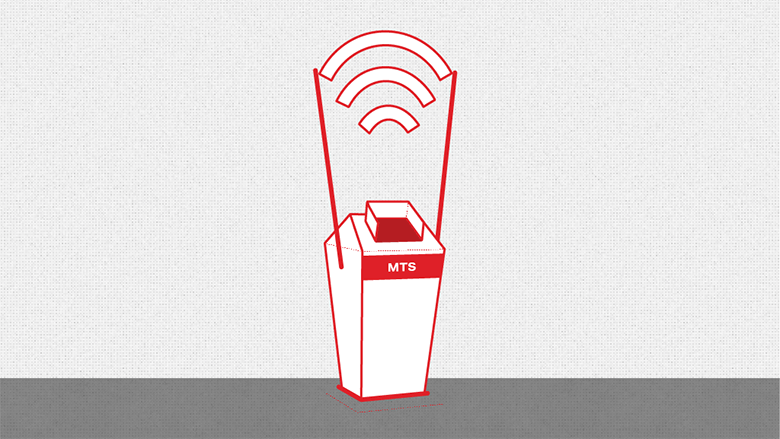ThinkScream’s sensible trash can rewards customers with quarter-hour of free Wi-Fi for throwing issues away.
Trash belongs within the rubbish bin.
It is a easy civic lesson that has annoyed two Mumbai entrepreneurs for years.
“India is a country where people love to break the rules,” stated Raj Desai, cofounder of startup ThinkScream.
“We see it on the roads where no one is driving in their lane. We see it in the way people disrespect public spaces by throwing garbage anywhere that they want to.”
So Desai and cofounder Pratik Agarwal had an thought: Reward folks for throwing issues away.
Associated: Inside Mumbai’s colourful taxis
The thought for the sensible rubbish can happened at a preferred Bangalore music competition in 2013.
“Pratik and I got lost and it took us two hours to find each other,” stated Desai. “It struck us that we needed to come up with a solution for people to stay connected at these events.”
They had been additionally struck by the large quantities of trash all over the place.
So Desai and Agarwal, each 26, invented a trash can that rewards folks with quarter-hour of free Wi-Fi each time they toss something away.
 The sensible trash bin from ThinkScream.
The sensible trash bin from ThinkScream.
The plastic bin (which prices about $1,470) is four-and-a-half toes excessive with an LED display. Once you toss something in it, the display flashes a novel code to entry quarter-hour of Wi-Fi (which works inside a 50 meter radius).
ThinkScream partnered with a neighborhood telecom firm and debuted six sensible bins at a music competition in 2014.
Since then, the startup has acquired quite a lot of inquiries from firms who see it as a viral branding alternative, Desai stated.
“But that wasn’t our intention,” he stated. “It wasn’t a gimmick. It was meant to be a catalyst for the public to change their behavior and stop littering.”
Associated: Delhi to revive automobile restrictions in effort to wash air
Utilizing expertise to alter habits is what Desai and Agarwal got down to accomplish once they launched their startup in 2012.
ThinkScream comes up with revolutionary methods to supply Wi-Fi to Indian shoppers.
Its flagship product, custom-made for film theaters in Mumbai, allowed folks to make use of Wi-Fi to order meals from the concession stand and and have it delivered to their seats. They rolled it out into 60 theaters in Mumbai. ThinkScream has additionally partnered with music competition organizers to supply attendees with straightforward Wi-Fi entry.

How profitable are the bins? It is too early to inform, stated Desai.
“We haven’t done a before-and-after analysis yet, but anecdotally we know that people do like to use the bin for the wow factor at first and then for the free WiFi,” he stated.
ThinkScream does not have any sensible bins at the moment deployed (though there are a number of check bins at occasions and faculties). However Desai is inspired that personal firms and authorities businesses have reached out to see how the bins will be deployed in massive cities like Mumbai.
Mumbai, Desai’s hometown, is India’s most populous metropolis with greater than 18 million residents.
It’s also the world’s fifth prime producer of stable waste, in response to a Might 2015 report by the Proceedings of the Nationwide Academy of Sciences.
Town generates over 7,000 tonnes of stable waste day by day, in response to India’s Central Air pollution Board Management company. And numerous that waste is not correctly contained in trash bins.
“It’s unhealthy and can lead to diseases,” stated Desai.
Associated: This plastic rest room may save lives
The free Wi-Fi may entice folks in city settings the place extra residents have entry to cellular units. However what about rural areas?
Desai stated he is already considered the right way to tweak the bin’s design.
“Instead of free Wi-Fi, we’ll use an interactive image of a celebrity,” he stated. One instance: Indian cricketer Sachin Tendulkar.
“The LED screen could show a photo of Tendulkar frowning. But he’ll smile if you throw trash in the bin,” stated Desai.
Desai needs to quickly have his sensible trash cans round India — every little thing from film theaters and malls to public areas and rural communities.
“This is just one way to help change the mindset of people in India,” stated Desai. “We just hope that bureaucracy doesn’t slow us down.”
CNNMoney (New York) First printed February 23, 2016: 1:13 AM ET




